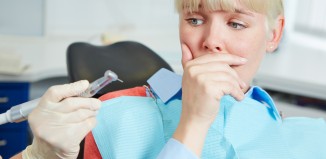Dental phobia (or odontophobia) is fear or anxiety experienced when faced with the likelihood of dental surgery or even a simple dental check-up in extreme cases. It is not an unusual response as one in every four people face the same problem.
Chatting to the patient is one of the most important parts of this technique. This allows us and the patient to understand each other better and talk more about the processes involved. We can then take the patient through all the various stages and guide them on what they will feel and what they can expect during any treatment. We've found that this allows the patient to enter the clinic with more confidence in a dentist they know and trust.
A: This may seem like a strange answer, but the best way to alleviate your worry about going to the dentist is actually to book a consultation. You can use your time with the dentist to discuss the way you feel and to get some expert advice. The dentist can then approach your dental assessment in a manner which is appropriate to you. In circumstances whereby further treatment is recommended, the dentist can recommend a course of action on a basis that is relevant to the concerns you have expressed.
Here at Bucharest British Dental Place we believe that truth and honesty need to pervade in every aspect of our working relationship with the patient and so before doing any treatment at all, it is important for us to manage the patient's expectations and tailor a personalised treatment plan and time schedule that works for them.
Occasionally, people who have severe dental phobia, young children and people with special needs may need general anaesthesia to have dental treatment. This means that you will be asleep during the treatment. All possible alternatives should be explored first.
Intravenous” means that the drug is put into a vein. An extremely thin needle is put into a vein close to the surface of the skin in either the arm or the back of your hand. This needle is wrapped up with a soft plastic tube. It makes the entry into the vein, then is slid out leaving the soft plastic tube in place. The drugs are put in through that tube (which is correctly referred to as an indwelling catheter”, but more commonly known by the tradename of Venflon). The tube stays in place throughout the procedure.
Lack of control is another recurring theme that crops up amongst peoples' reasons for wishing to avoid getting in the chair. (As we'll see down the article, there are ways around this, as receiving dental treatment by no means needs to be a completely passive experience.) The intimacy involved can also be a reason for people to feel uneasy or embarrassed. Likewise, negative past experiences are often put forward as reason people would rather stay away from the dentist.
New technology is specifically designed to make dentistry easier and more comfortable for patients. For example The Wand, numbing gel and air abrasion techniques are designed to help dental phobic patients enjoy a less intimidating dental experience.
Our caring and understanding team has trained to use both technology and techniques with worried patients suffering from dental phobia. Detailed below is information on how exactly we can help you and of course don't be afraid to give us a call if you need to know more or have any particular needs or issues.
Dental phobia can be caused by many different factors, for example, post traumatic stress brought on by past treatment. These can have nothing to do with dentistry but may produce a link between all medical procedures or professionals. Some patients feel a lack of control as the dentist is seemingly ‘in charge' of the situation. Our dentists at the Portman Dental Clinic in Maidnhead understand that every patients' uneasiness is singular and we are equipped to help.
I have struggled with going to the dentist my entire adult life. I had a traumatic experience as a young lad (skateboard accident) that required a rush to the dentist. It wasn't until recently that I have mostly overcome the fear (not that I like going). I find that the laughing gas does the trick for me. I spent 8 hours in the chair a few years ago and it went by without a problem. I also ask for a mouth prop so I can keep my mouth open long enough for them.
Common worries include fears about losing control, the sound of the drill, being in pain, injections, lying in the dental chair and having somebody standing over them. If you suffer from full blown dental phobia going to see the dentist can be overwhelming.
Many people who avoid visiting their dentist do not realise how much the dental industry has evolved. Dentists now have a broader range of products and treatments at their disposal. Drills are quieter and less intimidating, needles less painful. Dentists themselves are better trained and many dental practices are much warmer, welcoming, patient-friendly places.
No comments:
Post a Comment